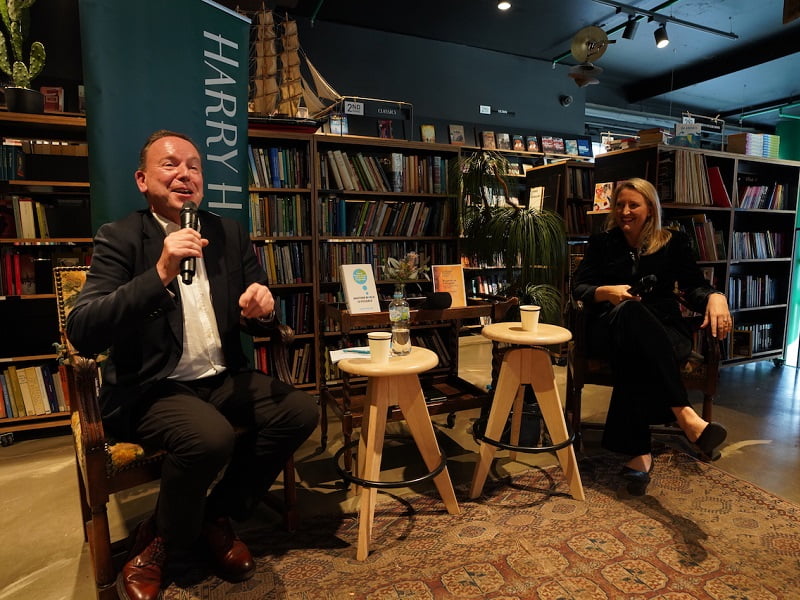How can the arts help us imagine a better future society and economy, without deep social gulfs or ecological harm?
As the forerunners of social change, “artists play an important role in countering the material bias… they help to prefigure and loosen up our brains to see the world in quite different ways,” according to Sir Geoff Mulgan.
Professor Mulgan, who works at the intersection of public policy, social movements and academia, was in conversation with Associate Professor Catherine Ball in Canberra to explore his recently published ideas around how creativity can advance social and political intelligence and combine diverse knowledge systems in new ways.
While we invest a huge amount of energy into technological imagination, and in thinking ahead to what could happen to robots or drones, or AI, or interfaces in brains, Professor Mulgan argues we do far less work on what might happen to consciousness, to how we think, feel and observe.
“Throughout history, changes in consciousness have been every bit as important as the changes in hardware,” he explained. “And yet, we have this kind of distorting materiality bias – smart cities, smart homes … they’re smart that but they’re never about smartness in that sense of consciousness or wisdom, or insight.”

Professor Mulgan is particularly interested in the 19th Century working class knowledge movements throughout Europe. These “social movements of political imagination” built strong communities around everything from writing, libraries and microcredit to jobs, insurance and ideas about utopia. They sought not just to fix poverty in the present, but to imagine a better future and a very different kind of society.
“They wrote about it, they formed clubs about it, they organised around it. I think we sometimes forget just how dynamic those cultural movements were, with no connection at all to universities or elite institutions.”
While these early movements were hopeful about the future, Professor Mulgan has observed that in the past 20 years, we’ve become less optimistic and more worried about the future. There is a growing tendency to catastrophise in a dark way.
“This is a broader story about the loss of a sense of positive imagination and possibility, which also manifests in the polling data across the world, including in Australia, where large majorities of people expect their kids to be worse off than then we have a pervasive pessimism around us,” he said. “And at the same time, there is a growing social inequality of voice in all sorts of fields.”
Professor Mulgan pointed to UK’s creative economy, where people working in publishing, film and TV come from more elite backgrounds than a generation or more ago. Similarly, in the United States, he pointed to a survey of 1.8 million people that showed how tech innovators typically had a parent working in the tech industry.
“Of the bright, poor kids who were doing really well in maths at age 11 to 15, almost none of them were playing a part in that digital economy by their 20s. This is the complete opposite to story America tells itself, the story of social mobility in this very open innovation system,” he said.
“The authors of this study (that included top US economists) said that if there’s one thing that we are essentially throwing away our most valuable resource, the creativity, the dynamism of all these kids who don’t have bright backgrounds aren’t growing up in the right places as it were.”
A proposed intervention is to shift away from generous incentives for venture capital in favour of giving children everywhere the experience of making things and innovating at school. The conversation then moved on to ideas about how to disrupt entrenched inequality through access to education.
He invited the audience to picture a future society where there is some kind of parity of esteem and access to opportunity. What would it take to imagine a world in which people thrive and where we improve our democracy, welfare, neighbourhoods or education?
Moving on to the regulatory environment and its ability to keep pace with technological change, as a member of the European Parliament’s advisory group on AI law, Professor Mulgan is curious about the continuing lag in proposed laws to ban facial recognition AI.
“The mystery is, why this didn’t happen in 2012? My own observation is that politicians in many countries didn’t understand it at all and were terrified and therefore felt they had to have national AI strategies, which were essentially all about economics and competitiveness and not being left behind in the race.”
“We are in real danger as an enormous investment in technologies continues without serious investigation of their social and political dimensions,” he warned, adding that a missing capability in most governments is the boundary of tech, society and politics.
Sir Geoff Mulgan is Professor of collective intelligence, public policy and social innovation at the University of College London. He is a former Director of Policy at 10 Downing Street under Prime Minister Tony Blair. Sir Mulgan was in Australia to discuss his most recent book, ‘Prophets at a Tangent: How Art Shapes Social Imagination’ (Cambridge 2023).
Do you know more? Contact James Riley via Email.
